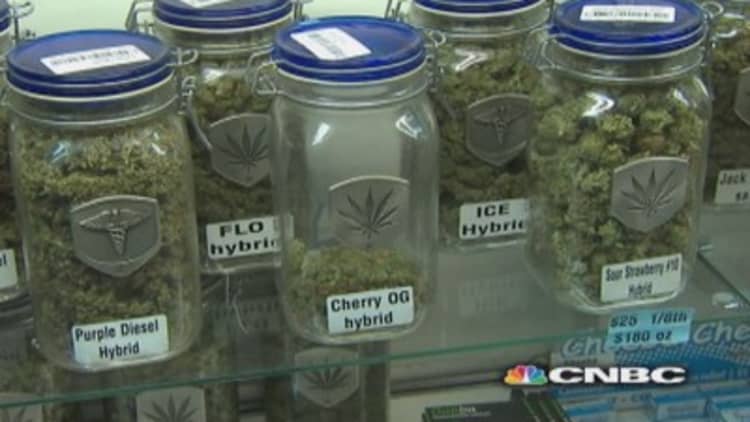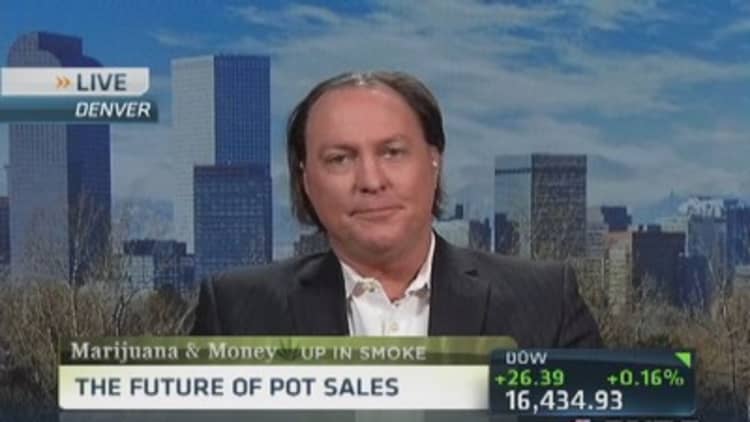
Yaniv Eshed is a big believer in the medical benefits of marijuana for children.
Eshed's 9-year-old son, Aviel, is being treated for bone marrow cancer at Sheba Medical Center, the largest hospital in Israel. Yaniv Eshed told CNBC that he wishes he had learned about medical marijuana before Aviel was already six months into his chemotherapy treatment.
Read MoreThis high-tech vending machine sells marijuana
"I was not aware like I am aware now," Eshed told CNBC. "If someone told me at the beginning that there was this option of cannabis, I think I could have saved him a lot of months of pain."
Medical marijuana is estimated to be a $40 million industry in Israel, and research conducted there has helped fuel America's own medical marijuana business, which is expected to be worth more than $2 billion this year alone.
Many doctors in the United States and elsewhere question the efficacy of medical marijuana and call for more research on cannabis before it is broadly legalized. An increasing number of studies also shows that regular marijuana use can harm the development of young people's brains.
The legality of medical marijuana is determined on the state level in the U.S., but it's legal nationally in Israel. That country's largest medical cannabis supplier, Tikun Olam, was started by businessman Tsachi Cohen in 2006 as a philanthropic, private company aimed at delivering marijuana to sick patients for free. Cohen received the first license to grow marijuana from the Israeli Ministry of Health in 2007.
Read More'We're not Amsterdam': Is Colorado pot tourism a myth?
Following initial success with Israeli hospitals, the company is now appealing to Israeli, Palestinian, and international organizations in an effort to bring medical marijuana to sick children who receive medical care not only within Israel, but under the Palestinian Authority as well.
Unlike in Israel, there is still a major stigma about marijuana as medicine in Palestine.
"Currently, we have a qualified Arab-Israeli male nurse that is fluent in Arabic, and we are also treating a number of Palestinian children from Ramallah and Gaza that have cancer and are hospitalized in Israeli hospitals," Eran Rise, spokesman for Tikun Olam, told CNBC.
Sheba Medical Center is unique in that it's a government-run hospital, where patients consume THC and Cannabidiol (CBD) oil as well as cannabis pills on-site.
Tikun Olam has about 4,000 patients, or about 30 percent of Israel's medical marijuana recipients. The company has 60 employees including nurses, doctors, researchers and agronomists.
Most patients pay Tikun Olam $100 per month for medical cannabis, who also pay a one-time fee of $40 for a tutorial on how to properly use the cannabis. Those prices are determined by the Israeli Ministry of Health, which issues licenses for qualified patients to receive the marijuana. The $100 is a service fee, not dependent on how many grams of marijuana a patient receives.
For children with cancer, the cannabis is free. Though Tikun Olam has seen success in treating Arab and Jewish patients with marijuana in Israel, it has yet to find a partner to help it do the same in the Palestinian Authority.
The company is now appealing to Doctors without Borders and Physicians for Human Rights (PHR). Tikun Olam has high hopes for Zvi Bentwich, former chairman and current board member of PHR.
Read MoreHow legal marijuana could be the next great American industry
Bentwich was the first doctor to conduct research on HIV/AIDS in Israel. One of his patients was the first with an official license to use cannabis in Israel to help with the side effects associated with the disease.
"Giving cannabis to pediatric oncology patients is a good idea in general because it may help them overcome some of the problems associated with the disease," Bentwich told CNBC.
It's not just children who are turning to medical marijuana in Israel. Grandparents are using it as well.
CNBC visited a nursing home called Hadarim in Kibbutz Na'an where patients as old as 103 consume marijuana, in more ways than one.
Read MoreCramer: This 'cannabis' stock will quickly double
Some ate it in porridge, others took cannabis pills, one patient smoked it out of a pipe, and one even received cannabis injections directly to the stomach.
Going global?
Some countries outside the Middle East have turned to Israel for help in trying to fuel their own medical marijuana industries. But for a variety of reasons, that's unlikely to happen anytime soon in the United States, at least on the federal level.
Czech Health Minister Svatopluk Nemecek visited a grower in Israel last month to see if it would be possible to import medical marijuana from Israel. Tikun Olam is also working with Canadian company MedReleaf on similar issues.
Former New York Deputy Comptroller for Budget and Public Affairs, Ari Hoffnung, visited Tikun Olam in Israel several months ago because he was interested in possibly replicating Israel's medical cannabis model in New York.
Read MoreBanks balk on marijuana money despite US guidelines
"I absolutely think that key elements of the Israeli model could and should be replicated in the U.S." Hoffnung told CNBC. "Right now, the main hurdle is that marijuana is still considered a schedule 1 drug, and America has not figured out a way to proceed with extensive cannabis research despite that the way Israel has."
The Controlled Substances Act of 1970 describes Schedule 1 drugs are substances with "a high potential for abuse," and for which therefore it's illegal to write prescriptions.

Aaron Houston, strategist for marijuana technology company Ghost Group, has been advocating for legalization in the U.S. for over a decade.
He was the chief marijuana legalization lobbyist on Capitol Hill from 2005-2010 and helped to write all current legislation that is related to marijuana.
He told CNBC that the Israeli model was attempted in the U.S., but to no avail. The federal government moves too slowly on legalization, he said, and marijuana's Schedule 1 status is difficult to overcome.
"Our government had a chance to experiment with this and we failed because of bureaucratic hurdles and obstacles," Houston said. "The Israeli model is logical; it's just not practical here."
—By CNBC's Dina Gusovsky.


